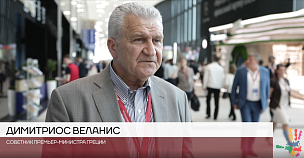In this work, EY examines the adverse effects of the coronavirus pandemic on Russian businesses. The study is based on an online survey of over 230 senior executives representing small, medium-sized and large companies. The respondents answered a set of topical questions about business resilience, awareness about measures of state support, the effectiveness of these measures (including on the sectoral level), etc.
The Roscongress Foundation presents the salient points of the publication accompanied by fragments of broadcasts of relevant panel discussions from the business programme of international events held by the Roscongress Foundation.
Approximately 80% of respondents say their revenues decreased because of the anti-pandemic restrictions.
Many businesses suffered serious losses during the crisis caused by the pandemic. 27% of respondents report a 50% drop in revenue, 25% say their revenues decreased by 20 to 50%, and 27% mention a slight decline of less than 20%.
Companies with the revenue losses of over 30% mostly operate in car manufacturing, airport services, tourism and HoReCa, education, real estate, manufacturing, retail, and logistics and transportation.
A small share of the participants of the survey (6%) state that their revenues increased. These respondents mainly represent FMCG, retail, and ICT. The results of the survey suggest that the chemical industry, healthcare and pharma, and FMCG were the least affected by the crisis.
76% of entrepreneurs think that the restrictions pose a threat to the existence of their business and may lead to company closure if they aren’t lifted soon.
10% of respondents say that their company is either on the brink of closure or will be in a tight corner if anti-epidemic restrictions aren’t lifted within two weeks (the survey was conducted between 24 and 30 April 2020). 51% of respondents believe that their business can last for one to three months at the most, and 15% think their company has enough strength to survive for another three to six months. As few as 24% of executives are certain that their company isn’t threatened with closure.
The results of the survey show that business resilience is directly related to company size: while 20% of SMEs are already on the verge of closure or will be within two weeks, for large private companies the corresponding figure is as low as 7%. On average, the expected business survival time is one to two months for SMEs and large private companies alike (47% of responses for SMEs and 39% for large companies). Meanwhile, 80% of CEOs of companies partially owned by the state don’t think that the current crisis will lead to a closure of their company.
Nearly a half of the respondents say that it will take over a year for the economy to recover after the restrictions are lifted. Another 27% expect that the economy will return to pre-crisis level in six to twelve months. As few as 21% hope to see a quick rebound within six months.
15% of respondents are certain that their business will never return to pre-crisis scale, while 36% think that it will, but no sooner than after a year. As few as 15% anticipate a prompt revival (within three months). Notably, among SMEs the share of entrepreneurs who forecast that the recovery will take more than a year reaches 45%. Also, representatives of SMEs more often state that their business will never return to pre-crisis scale (20% for SMEs against 13% for large companies).
Over 70% of entrepreneurs demonstrate high awareness about instruments of state support and are actively using them.
The participants of the survey are fairly active in making use of measures of state support. Despite all the difficulties, companies lay off their employees or put them on unpaid leave as a last resort only.
The most popular anti-crisis measures, according to the respondents, are the following:
- 38% — reducing operating costs;
- 30% — reducing or deferring lease payments;
- 26% — switching to part-time working week;
- 24% — renegotiating contracts with suppliers.
On the whole, the set of anti-crisis measures doesn’t depend on the size of the company, with both SMEs and large companies adopting the above measures roughly equally.
However, SMEs are rather more active in doing this, and they also tend to reduce profit margin more frequently. State-owned companies adopt anti-crisis measures less actively because they use other methods to reduce operating costs.
The respondents demonstrate high awareness about measures of state support (over 70%). The least known measures are those of sectoral and regional support. Also, few entrepreneurs know about tax deduction for expenses related to anti-epidemic measures, as well as about subsidies and compensations for expenditure on marketing, exports, engineering, and business development (Moscow only), and about deferral of lease payments.
For more information about possible ways to stabilize the economy during the pandemic, please see the StayHomeEconomy special section of the Roscongress information and analytical system, and the Entrepreneurship and SMEs sections about measures aimed at supporting entrepreneurship.






